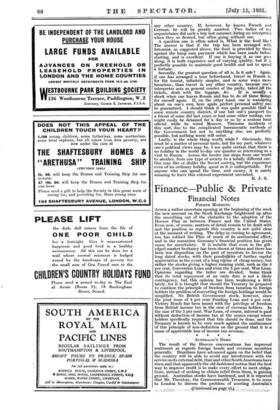Finance—Public & Private
Financial Notes
FIRMER MARKETS.
AFTER a rather uncertain opening at the beginning of the week the new account on the Stock Exchange brightened up after the smoothing out of the obstacles to the adoption of the Hoover Plan as between France and the United States. Even now, of course, matters of detail remain to be dealt with and the position as regards this country is not quite clear at the moment of writing. The delay in coming to agreement, too, has robbed the Plan of much of its sentimental effect, and in the meantime Germany's financial position has given cause for uncertainty. It is notable that even in the gilt- edged market hesitancy has been shown at times and there has been less disposition on the part of investors to favour the long dated stocks, with their possibilities of further capital appreciation in the event of a long re:gin' te of cheap money, but rather the stocks giving a higher running yield, such as the 5 per cent. Conversion Loan and even the 5 per cent. War Lban. Opinions regarding the latter are divided. Some think that its total repayment at an early date is not a likely contingency, but this opinion has been weakening a little lately, for it is thought that should the Treasury be prepared to continue the principle of freedom from taxation to foreign holders the problem of converting the foreign holdings would be simplified. No British Government stock, however, since the joint issue of 4 per cent Funding Loan and 4 per cent. Victory Bonds has been issued with the privilege of freedom from British income tax in the case of overseas holders. In the case of the 5 per cent. War Loan, of course, interest is paid without deduction of income tax at the source except where holders specifically request that this should be done, and the Treasury is known to be very much against the continuance of this principle of non-deduction on the ground that it is a cause of appreciable loss of income tax revenue.


































 Previous page
Previous page